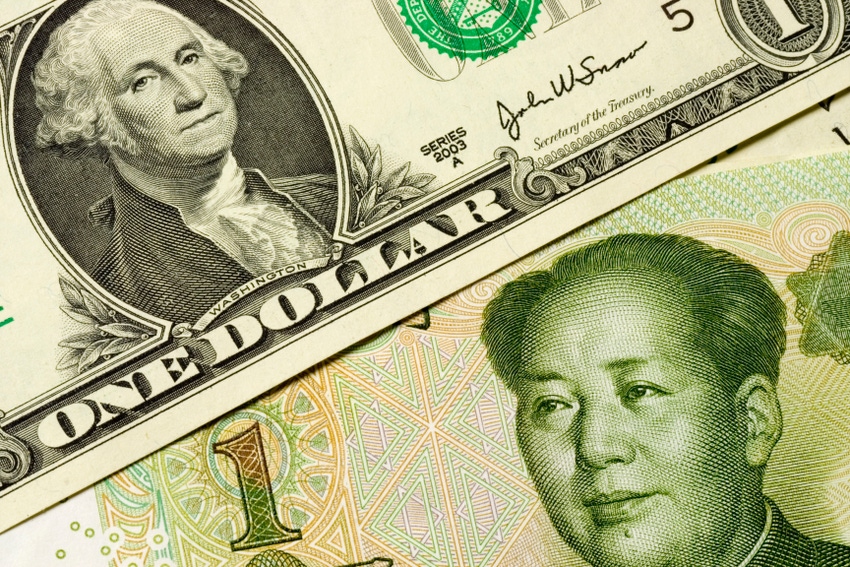
by Bloomberg News
China’s stance on U.S. trade can be illustrated by one of Sir Isaac Newton’s laws of motion: For every action, there’s an equal and opposite reaction.
From steel to solar, Beijing has responded in kind to what it deemed as trade slights from Washington. It also has sought World Trade Organization protections, and with some success.
That’s something for President-elect Donald Trump to weigh as he decides whether to honor his proposal for tariffs on the world’s largest trading nation, which had $627 billion in U.S. trade in 2015.
A Communist Party newspaper this week gave a flavor of what could come, suggesting "tit for tat" retaliation should a trade tiff erupt. "Boeing orders will be replaced by Airbus," the Global Times said in an editorial. "U.S. auto and iPhone sales in China will suffer a setback, and U.S. soybean and maize imports will be halted."
Here’s how history could be a guide:
Steel
The latest U.S. anti-dumping action against Chinese steel was a preliminary ruling in September on imported stainless steel sheets and strips from China, after American tariffs of 266% on Chinese cold-rolled steel imports were announced in May.
In October, China extended anti-dumping tariffs on U.S. exports of caprolactam, a material used in textiles. Beijing also scored a victory over the U.S. at the WTO in a dispute over U.S. duties imposed on 13 imported Chinese products--three years after Beijing first filed the case.
Tires, Chicken
Chronology sometimes says more than causality. In 2009, the U.S. imposed tariffs on Chinese tires. In 2010, China announced charges on U.S. poultry. The U.S. filed a WTO complaint in 2011. Beijing’s broiler chicken duties of as much as 105.4% hurt about 300,000 workers and farmers, the U.S. said at the time. In 2013, after the WTO upheld the U.S. on tire tariffs, China renewed its investigation into American poultry.
In 2015, the U.S. announced duties on Chinese tires in June after a year-long investigation. China said later in August the same year that it would keep current countervailing duties on U.S. broiler chickens and relaunch a subsidy investigation. In August, the U.S. again imposed duties on truck tires. In September, China extended anti-dumping duties on U.S. chicken for five years, raising them as much as 73.8%.
Aircraft
Boeing Co., the largest U.S. exporter, has long been a key bellwether for trade relations. China Southern Airlines threatened in 1995 to pull the plug on $2 billion of orders based on progress in talks over copyright law, then didn’t. The next year, Boeing said strained trade ties would hurt sales after China gave Airbus Group SE its biggest-ever order for $1.5 billion.
While China doesn’t sell its own commercial aircraft, yet, trade tension could still arise. President Xi Jinping gave Boeing a $38 billion order last year on a plant visit in Seattle.
Solar
In July, the U.S. raised anti-dumping duties on photovoltaic products from China. Two months later, China imposed anti-dumping and anti-subsidy duties on distiller’s dried grain, a byproduct of ethanol and animal feed, from the U.S.
In 2014, China hiked tariffs to 57% for U.S. exports of polysilicon used in solar cells. That rippled through to small manufacturers like REC Silicon ASA in Moses Lake, Washington, and Hemlock Semiconductor Corp. in Hemlock, Michigan. The dispute with China, the biggest market for materials used in solar panels, pressured U.S. producers to cut output and prices.
Technology
China stepped up efforts to shift to domestic technology companies after 2014 revelations of widespread spying by U.S. intelligence agencies using American electronics to snoop. It complicated life for U.S. firms like Cisco Systems Inc., Intel Corp. and Hewlett-Packard Co.
Meanwhile, Chinese regulators pursued antitrust probes against Microsoft Corp. and Qualcomm Inc. Microsoft’s China offices were raided, Windows software banned from government PCs, procurement of Apple Inc. iPads was blocked. Now, foreign tech firms must give Beijing unprecedented access to their systems under a new law. Trump’s tariff plans could hurt U.S. buyers too. Cellphone imports are now duty free, but such tariffs would raise the average price by $90.08 per phone, according to a Bloomberg Intelligence analysis.
Just this week, a top official from China’s ministry of industry and information technology met Qualcomm President Derek Aberle to encourage the company to work with Chinese counterparts on 5G standards and technologies.
Fishing
China’s counter-punches haven’t been restricted to responding just to commercial actions. Norwegian salmon exports to China plunged after the country’s parliament awarded the 2010 Nobel Peace Prize to imprisoned Chinese dissident Liu Xiaobo.
In 2010, when a Chinese fishing boat and a Japanese Coast Guard vessel collided in contested waters, China stopped giving Japan export licenses for rare earth metals, needed for cars and electronics. Licensing resumed days later after Japan released the boat captain.
--With assistance from Christopher Anstey and Jeff Kearns. To contact Bloomberg News staff for this story: Miao Han in Beijing at [email protected]; Kevin Hamlin in Beijing at [email protected]
To contact the editors responsible for this story: Malcolm Scott at [email protected]
Jeff Kearns, Enda Curran
© 2016 Bloomberg L.P
About the Author(s)
You May Also Like




